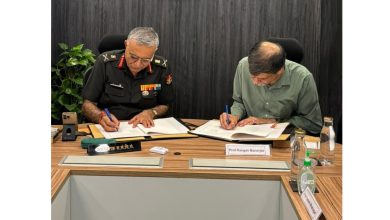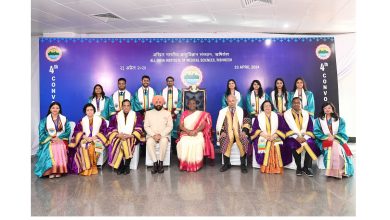Minister of State for Commerce stresses on collaboration between India, East Asian nations in health

Anupriya Patel was addressing East Asia Summit-Economic Ministers’ Meeting
The T9th EAS-EMM (East Asia Summit-Economic Ministers’ Meeting) was recently held virtually. Addressing the meeting, Anupriya Patel, Minister of State for Commerce and Industry said the World Trade Organisation (WTO) had observed that the strong monetary and fiscal policies introduced by many governments in response to pandemics helped to sustain the global demand and trade. Considering the encouraging trend, WTO had also revised its projection for global trade volume growth in 2021 to 8 per cent compared to the 7 per cent earlier.
“Various immediate supportive actions taken by India, including the milestones reached in vaccination helped us to manage the pandemic crisis. We have learnt lessons, adapted our approach and fine-tuned our systems as we went along,” she said.
She said that the world needs meaningful partnerships, sharing of advanced technologies, collaboration in vaccine and pharmaceutical production, capacity building and transparency in health information. India is willing to collaborate with East Asian partners in the production of generic drugs and medical technologies used for the treatment of COVID-19 patients, as also in the area of vaccines production. 70 per cent of the global vaccines are produced in India and our capacity to produce quality medicines and vaccines at affordable prices are globally recognised.
In an interconnected and globalised world, no one is safe until everyone is safe; India looks forward to an early outcome on the TRIPS Waiver proposal for vaccines, therapeutics and diagnostics. Shared prosperity is impossible without shared commitment.
She stated that India endorses the concept of working towards ensuring a trustworthy and reliable supply chain. “I have keenly listened to Economic Research Institute for ASEAN and East Asia (ERIA) discussion on the value chains and post-pandemic recovery in East Asia. Regional and global value chains are a core element of the economic strength of the EAS region. It is heartening to know from ERIA’s research work that the pandemic so far did not disrupt the production system and trade patterns in East Asia Region and the region maintained its importance in the World Trade Network,” the MoS said.
While acknowledging the progress achieved so far, India would like to emphasise the need to further strengthening the EAS work processes for appropriate coordinated responses to the pandemic, learning from each other’s best practices. Acting East is now a central element in India’s Indo-Pacific vision. India wants to see a strong, unified and prosperous ASEAN playing a central role in the emerging dynamic of the Indo-Pacific. We see a great deal of convergence between India’s vision for the Indo-pacific and the ASEAN Outlook on Indo-Pacific.
She congratulated and thanked Brunei for its efficient role as the Chair of ASEAN. She also commended the ASEAN Secretariat for putting together a useful analysis of regional and global economic development in the discussion papers. She concluded by reiterating that India’s support in collective actions of the EAS Forum aimed at mitigating the economic impact of the pandemic and strengthening regional economic architecture.
India recognises that the international community has a collective responsibility to work together against the COVID-19 pandemic in the true spirit of partnership within existing international frameworks. India endorses the concept of working towards ensuring transparent, trustworthy, dependable & reliable supply chain. India is a part of the ‘Supply Chain Resilience Initiative’ launched in September, 2020, as a firm step towards building resilient supply chains in the region.
Though, the abundance of trade agreements in Indo-Pacific has led to a decline in tariff rates over time, non-tariff measures act as a major trade barrier in the region. In spite the hitherto available scientific evidence and literature confirming that the COVID 19 virus cannot survive on surfaces and food packages, the exports, especially the agri exports, of many countries, including India, faced restrictive measures on account of COVID concern on the packaging.




